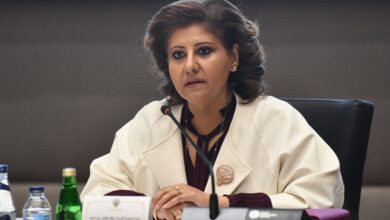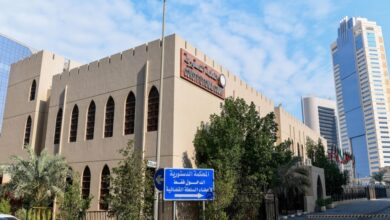Kuwait remembers poet Ahmed Meshari Al-Adwani
The Kuwait International Book Fair honors Al-Adwani, whose cultural legacy and national anthem lyrics has shaped Kuwait’s modern identity

The 48th Kuwait International Book Fair honored the legacy of the late poet Ahmed Meshari Al-Adwani, a pioneering figure of Kuwaiti thought, literature, and culture, and the author of the national anthem’s lyrics.
A special seminar titled “Ahmed Meshari Al-Adwani: Poet of the Nation and Icon of Arab Culture” began on Sunday at the Cultural Café in the Mishref Fairgrounds, drawing specialists, writers, and cultural enthusiasts. The seminar continues today, Monday.

The event opened with a documentary film produced by the National Council for Culture, Arts and Letters (NCCAL), portraying Al-Adwani’s life and achievements. The film described him, through comments by poet Dr. Khalifa Al-Waqyan, as “a symbol of culture in the Arab world.” It highlighted his birthplace in 1953 and his influence on Kuwait’s cultural renaissance, reports Al-Rai daily,
The documentary reviewed Al-Adwani’s major cultural contributions, including his role in founding the Kuwaiti Writers Association, Al-Bayan magazine, and major cultural series such as Alam Al-Fikr, Alam Al-Ma’rifa, and World Theater, in addition to establishing the Higher Institute of Musical Arts. It emphasized that his greatest national contribution was composing the lyrics of Kuwait’s national anthem, which instilled deep patriotic pride.

The film also shed light on Al-Adwani’s educational journey, beginning at Qibliya School and Al-Shuwaikh High School, and later his work in the Department of Education, where he played a vital role in curriculum development. His son, Maad Ahmed Al-Adwani, described him as quiet, thoughtful, and deeply concerned with issues related to children, education, poetry, and family.
In the symposium’s first session, moderated by Dr. Muhammad Al-Baghili, Dr. Ali Al-Jaafar, Professor of Children’s Literature, and Dr. Abdullah Al-Jasmi, Professor of Philosophy, discussed Al-Adwani’s upbringing, intellectual formation, and cultural impact. Al-Jaafar said honoring Al-Adwani is a tribute to an entire generation that built modern Kuwaiti culture, recounting his personal connection with the poet since 1984.
Al-Jaafar reflected on his weekly gatherings with Al-Adwani, describing them as rich intellectual circles where poetry and thought intertwined. He portrayed Al-Adwani as an authentic poet who valued heritage while embracing innovation and modernization. These meetings left a lasting influence on his understanding of culture, literature, and human values.

Dr. Abdullah Al-Jasmi highlighted Al-Adwani’s role as a leading figure in Kuwait’s modern cultural, educational, and humanitarian history. He described Kuwait as an open, civil society whose environment shaped Al-Adwani’s intellectual outlook, making him an influential enlightenment thinker whose cultural series earned widespread Arab acclaim.
The second session, moderated by Dr. Mohammed bin Nasser, featured literary critic Dr. Abbas Al-Haddad and novelist Talib Al-Rifai, who addressed the poet’s cultural legacy. Al-Haddad explained that Al-Adwani grew up surrounded by literature and science, gaining early knowledge from his father’s library before continuing his studies at Al-Azhar University in 1939, which shaped his deep scholarly foundation.
Al-Haddad emphasized that Al-Adwani was a pioneer of Kuwait’s cultural institutions, especially through his work in the Ministry of Education and Information and later as Secretary-General of the National Council for Culture, Arts and Letters (NCCAL) in 1973. He noted Al-Adwani’s unique blend of authenticity and innovation, which made him one of the most influential cultural figures in Kuwait and the Arab world.

Writer Talib Al-Rifai highlighted the lifelong partnership between Al-Adwani and Abdulaziz Hussein, beginning in childhood and continuing through their studies in Cairo. This partnership yielded important cultural projects, including the magazine Al-Ba’tha. Al-Rifai added that Al-Adwani’s return to Kuwait coincided with the nation’s formative years after the 1946 oil export, where he helped shape national identity and cultural policies.
Al-Rifai also noted that Al-Adwani, though a gifted poet, devoted much of his life to cultural work rather than publishing poetry. His only collection released in his lifetime was “Wings of the Storm” (1980), followed posthumously by “Oshal” and “Images and Incidents.” His poetry embodied a broad human vision, but he prioritized serving Kuwait through the National Council’s influential publications.
The seminar continues today with its third and fourth sessions featuring contributions from Dr. Khaled Ramadan, Dr. Khaled Al-Qallaf, Dr. Mohammed Al-Dihan, Dr. Saud Al-Harbi, and writers Hamza Al-Olayan and Talal Al-Rumaidhi, further examining the profound cultural legacy of Ahmed Meshari Al-Adwani.












